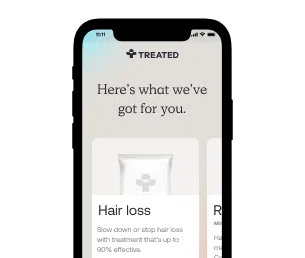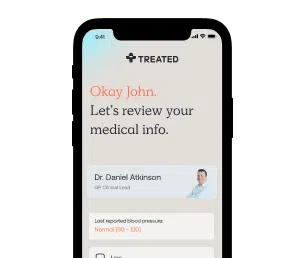Insomnia
Get restful sleep when you need it.
Secure delivery
UK clinicians
Insomnia is a condition that affects how well and how much you sleep. It can be caused by stress, changes in your sleep routine or be hereditary.
We can help you find the treatment you need. Talk to our clinicians to get tailored advice, and order insomnia medicine online.
Insomnia is a common sleep disorder that makes it difficult to fall or stay asleep. Lack of sleep (or quality sleep) can cause daytime tiredness, irritability and anxiety. Persistent insomnia has also been linked to obesity, metabolic disease , diabetes and depression.
There are two types: primary and secondary. If you have primary insomnia, it’s caused by a lack of melatonin (sleep hormone) and isn’t linked to any other health condition or illness, or medication. Secondary insomnia is when there’s another physical health factor responsible for your lack of sleep. If you have trouble sleeping because you drink a lot of alcohol late at night, for example, this is secondary insomnia. But if you have trouble sleeping due to stress, sensitivity to lights or noises, or changes in your sleep schedule, this is primary insomnia.
Insomnia can last for one night, or go on for months or years. The longer you live with insomnia, untreated, the more likely you are to develop secondary problems, like depression or cardiovascular illness.
Anyone can get insomnia. It’s common in both adults and young people. It’s often linked to lifestyle habits, working conditions or the sleep environment. Anxiety can also cause insomnia.
But primary insomnia is more often experienced by older people over the age of 55. As we get older, our melatonin levels tend to fall naturally. Treatments like Circadin are specifically licensed for the treatment of insomnia in people over 55. When it’s given to people who don’t have primary insomnia or are under 55, it’s an ‘off-label’ use.
Insomnia is a common disorder. Studies show that 30%-40% of adults will have persistent insomnia at some point in their life. Insomnia is thought to be most common in older people, with one estimate suggesting that almost 50% experience some degree of insomnia.
Teenagers are at risk, with 23% in one study of 16-19 year olds suffering from some type of insomnia. An analysis of pregnant women found that 52% report symptoms of insomnia at some point during their term .

How we source info.
When we present you with stats, data, opinion or a consensus, we’ll tell you where this came from. And we’ll only present data as clinically reliable if it’s come from a reputable source, such as a state or government-funded health body, a peer-reviewed medical journal, or a recognised analytics or data body. Read more in our editorial policy.
There are a lot of possible causes. Clinicians class insomnia by its causes:
Primary insomnia is often linked to big life events like moving house, starting a new job, changes in routine, or a drop in melatonin.
So for example: the light, noise and temperature in your bedroom can stop you from falling asleep. Changing your sleep schedule can disrupt your sleep. Jet lag, shift work and a new baby can all affect your sleep and cause insomnia. There’s also some suggestion that insomnia could be genetic and run in families.
Older people are more likely to suffer primary insomnia because as you get older less of the sleep hormone melatonin is produced naturally by your body. Melatonin helps to keep your sleep in a regular cycle.
Secondary insomnia is common if you drink caffeine close to bedtime, use recreational drugs or drink alcohol in the evening. Even non-prescription medications like cold and allergy medicine can cause insomnia.
Mental health issues are also linked to insomnia. Insomnia is common in people who have depression, anxiety and ADHD.
Conditions such as hyperthyroidism, sleep apnea and restless leg syndrome can interfere with sleep too, and lead to insomnia.
Symptoms of insomnia include:
Over time, prolonged insomnia can also affect your mental wellbeing and lead to anxiety, depression and irritability.
Studies have suggested that persistent sleep deprivation can lead to a variety of other health issues including obesity, metabolic disease, anxiety and depression. It’s also been theorised that the less someone sleeps, the more at risk they are of developing a secondary illness as a result .
So it’s important if you’re experiencing insomnia to get advice, so that you can minimise the risk of developing a secondary health problem.

How we source info.
When we present you with stats, data, opinion or a consensus, we’ll tell you where this came from. And we’ll only present data as clinically reliable if it’s come from a reputable source, such as a state or government-funded health body, a peer-reviewed medical journal, or a recognised analytics or data body. Read more in our editorial policy.

How we source info.
When we present you with stats, data, opinion or a consensus, we’ll tell you where this came from. And we’ll only present data as clinically reliable if it’s come from a reputable source, such as a state or government-funded health body, a peer-reviewed medical journal, or a recognised analytics or data body. Read more in our editorial policy.
Have something specific you want to know? Search our info below, or ask our experts a question if you can’t find what you’re looking for.
Prevalence of chronic insomnia in adult patients and its correlation with medical comorbidities. Journal of Family Medicine and Primary Care, 5(4), p.780.
Insomnia in the Elderly: A Review. Journal of Clinical Sleep Medicine, 14(06), pp.1017–1024.
Insomnia in Adolescence. Medical Sciences, 6(3), p.72. [Accessed 9 Jul. 2019].
Insomnia in Pregnancy and Factors Related to Insomnia. The Scientific World Journal, 2012, pp.1–8.
The heritability of insomnia: Systematic review and meta-analysis of twin studies. Sleep Med Rev. 2021 Aug.
Extent and health consequences of chronic sleep loss and sleep disorders. nih.gov.
Adverse Events Associated with Melatonin for the Treatment of Primary or Secondary Sleep Disorders: A Systematic Review. CNS Drugs, 33(12), pp.1167–1186.

Contains the hormone melatonin, which helps you to get back to healthy sleeping patterns.

Daily tablet taken half an hour before bed. Contains a dual orexin receptor antagonist that promotes restful sleep.

Registered with GMC (No. 4624794)
Meet Daniel
Registered with GPhC (No. 2202465)
Meet Sanjeda
Registered with GPhC (No. 2070724)
Meet Craig
Always read the leaflet that comes with your medication and tell us about any side effects you get.
We know health, but you know you.
Our experts tell you what’s safe, but you decide what’s best.
Answer a few questions and tell us about yourself. Get tailored advice from our clinicians so you can choose better.

Choose your treatment and how often you have it delivered.

We know things change. It’s the nature of life. We’ll check in regularly to make sure your treatment is still right for you.
Pause. Change. Skip. Start again. Any time you like.
Here are some other things we can help with.
Choose from our range of tablets and solutions. Get ongoing care and support from our experts.
Stop smoking treatments that can help you kick the habit forever, and reduce your risk of disease.
Tablets or injections. Tailored weight loss treatments combined with ongoing support from our experts.
We're making healthcare more about you. Sign up to our newsletter for personalised health articles that make a difference.
Disclaimer: The information provided on this page is not a substitute for professional medical advice, diagnosis, or treatment. If you have any questions or concerns about your health, please talk to a doctor.
We couldn't find what you're looking for.
Here's everything we treat. Or, if you're looking for something we don't have yet, you can suggest something.
If there’s a particular treatment or condition you’re looking for, tell us and we’ll look into it for you.
Submit your question here, or tell us if you’ve found an issue on our site.
We’ll get back to you very soon. We aim to respond to all queries in one working day.
You’re signed up to our newsletter. Keep an eye on your inbox for our latest update.
By clicking 'Subscribe now' you're agreeing to our Privacy Policy.
We’ve sent you an email asking you to confirm your email address.